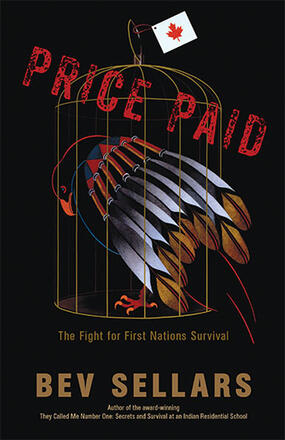
Price Paid
The Fight for First Nations Survival
La description
The book begins with glimpses of foods, medicines, and cultural practices that North America’s Indigenous peoples have contributed to the rest of the world. It documents the dark period of regulation by racist laws during the twentieth century, and then discusses new emergence in the twenty-first century into a re-establishment of Indigenous land and resource rights.
Reviews
“Sellars uses a broad brush with personal detail here and there to help readers understand Aboriginal issues in Canada today … a good primer.”
—Chris Arnetttt, author of The Terror of the Coast: Land Alienation and Colonial War on Vancouver Island and the Gulf Islands, 1849–1863
“By beginning to unveil some painful truths in Canada’s ‘hidden history,’ Chief Bev Sellars provides context and deep understanding that remain at the root of the troubled relationship between Canada and Aboriginal peoples. Some individuals will find these stories troubling, but as painful as these stories are, they must be told if we are to ever have reconciliation and understanding between Aboriginal and non-Aboriginal Canadians.”
—Mary Simon, co-chair, Canadians for a New Partnership, former Canadian ambassador, and president of Inuit Tapiriit Kanatami One
Bev Sellars does not mince words in her turbo-charged history lessons. … Price Paid is sometimes painful reading but it is necessary if we are to move forward as a country – First Nations and newcomers together – armed with knowledge and empathy.”
—BC BookWorld
“Bev Sellars does not mince words in her turbo-charged history lessons. … Price Paid is sometimes painful reading but it is necessary if we are to move forward as a country – First Nations and newcomers together – armed with knowledge and empathy.” —BC BookWorld
“[Sellars] tells Canada’s history from a perspective that has rarely been used before: … the people who call these lands their ancestral home. … This book is not a recommended read, it is a necessary read – especially for Canadians. … most readers will feel reborn upon reading this book, so hidden is the truth of Canadian history. … Equipped with the truth, Canadians can finally honestly and comprehensively celebrate our country.”
—Pacific Rim Review of Books
“Reconciliation between Aboriginal and non-Aboriginal peoples in Canada will advance only when non-Aboriginal Canadians learn, accept, remember, and respect Aboriginal perspectives and interpretations of our shared past and future. Bev Sellars’s powerful truth-telling about the cost to Aboriginal peoples of our history is essential reading for all Canadians.”
—Phyllis Senese, Professor Emerita of History, University of Victoria
“Stern without being pessimistic … readable yet data-rich … The logical reaction to having no idea what to do about an ongoing tragedy in your own country is to put some effort into understanding where the problem came from. This book is a great place to start.” —Broken Pencil
“A timely tome. So much of Native Canadian history has been swept under the rug by mainstream historians. Fortunately, books like this, written by Native authors themselves, are finally coming out of the closet, so to speak. And the timing couldn’t be better. Our country so needs these books. Our country so needs these voices.”
—Tomson Highway
“This is a book like no other. Bev Sellars combines her keen insights, her studies in history and law, and her experience as a chief of an ‘Indian reserve’ in British Columbia to produce a book that will open the eyes of Canadians to the reality of life under federal government administration. This book will be a significant contribution to the nationwide campaign of Indigenous people to emancipate themselves from the Indian Act and its administrators in Ottawa. Their aim as Sellars explains is meaningful participation in the decisions that affect their rights and interests. As Bill Wilson (Hemas Kla-Lee-Lee-Kla) writes in the foreword, ‘Truth and knowledge are wonderful things.’ Indeed.”
—Paul L.A.H. Chartrand, IPC, Professor of Law, retired Former commissioner, Royal Commission on Aboriginal Peoples (1991–1996)